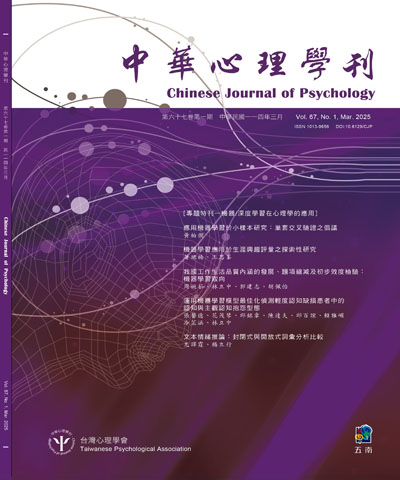
選擇卷期
- 期刊
真誠領導強調領導者在高度自我覺察與自我調控下,引領部屬自我發展,使組織與個人都能獲得正向助益。關於真誠領導的歷程機制,多聚焦於部屬對領導者的認同,強調部屬對於真誠領導者的正向態度,此為領導者焦點歷程,較為接近真誠崇拜所帶來的影響。此觀點並未觸及真誠領導者引領部屬發展自我的意涵,而忽略了部屬焦點歷程,也就是真誠感染所帶來的影響,致使真誠領導流於一種個人魅力展現的領導模式。為了彌補上述缺口,本研究以自我概念的角度出發,提出了領導者認同與職業認同的雙路徑模式。根據279組對偶的企業資料顯示,不論共事時間的長短,真誠領導皆會透過領導者認同的路徑,提升部屬的工作績效與利主管行為;然而,只有在共事時間長的情況下,真誠領導者才能夠透過職業認同來促進部屬的工作績效與利職涯行為。透過本研究,揭示了真誠領導促進部屬認同領導者與認同職業的雙路徑模式,補足了真誠領導引導部屬成長的重要路徑,為真誠領導研究提供了另外一種思考。
- 期刊
題目組合(Item parcels)為題目分數之加總或平均,可於結構方程模型(Structural Equation Modeling, SEM)分析中作為構念之指標。Little等人(2013)與Cole等人(2016)皆曾指出,多向度構念題目組合表徵之構念意涵可能不同於研究者原先之假設,致影響分析結果,故使用題目組合之前應先釐清其所反映之構念本質。多向度構念為涵蓋數個向度之構念,Cole等人以及Williams與O'Boyle(2008)皆指出許多心理學研究探討之構念乃為多向度,研究者並建構題目組合作為多向度構念之指標進行SEM分析。本研究因之擴展Sterba與MacCallum(2010)之題目組合共變數矩陣推導,由單向度構念延伸至多向度構念,自多向度構念題目組合之共變數矩陣組成,提供一理論架構使研究者能檢視題目組合所表徵之多向度構念意涵。本研究並進一步以此架構論述於不同題目組合策略、向度間相關,以及題目因素複雜度之題目組合所反映之多向度構念的本質,亦以一模擬資料為例展示推導結果。實徵研究者可透過本研究推衍之架構,檢視其所建構之多向度構念題目組合的共變數矩陣,藉之釐清其所表徵之多向度構念意涵是否符合原先假設,以避免不當之SEM分析結果。
- 期刊
The concept of self-compassion, an empathetic and nurturing attitude toward one's own sufferings and failures, has begun to gain research and clinical attention due to its strong link to psychological health. Nevertheless, in Taiwanese samples, systematic examination of the factorial and construct validity of the Taiwanese version of the Self- Compassion Scale is still warranted. In this study, 854 adults (age range: 20-64 years) were recruited to investigate the levels of self-compassion and the differential associations between self-compassion and psychological health. The results revealed that: 1) via EFA and CFA procedures, the Taiwanese version of the Self-Compassion Scale yields two composites: the incremental composite which was constituted by self-kindness, mindfulness, and common humanity, and the decremental composite which was constituted by self-judgment, isolation, and over-identification of negative experiences; and 2) with hierarchical regression analyses, after controlling for age and gender, the decremental composite was predictive of anxiety and stress, while the two composites were jointly predictive of depression and psychological well-being. Distinct levels of self-compassion were found across multigenerational samples. The younger groups displayed less self-compassion, especially with a manifestation of greater levels in the decremental composite of the Self-Compassion Scale. We discuss our findings of the age differences in self-compassion and their implications for psychological health.

